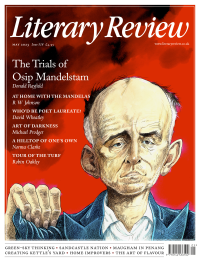Michael Burleigh
Tear Down These Peace Walls
How to Fix Northern Ireland
By Malachi O’Doherty
Atlantic Books 400pp £16.99
Over the three decades of the Northern Ireland Troubles, 3,568 people were killed and more than 47,000 others wounded. There is no exact figure for those left with PTSD, but it must be very high too. Cadaver dogs and ground-penetrating radar are still employed to help excavate the remains of victims of terror from decades ago.
The British like to boast of their skill in helping to negotiate the 1998 Good Friday Agreement (GFA) – a global template for resolving other conflicts, no less – rather than feeling ashamed about the duration and intractability of an intercommunal war in a province of the United Kingdom with about a quarter of the population of Greater London. The Stormont Assembly, the Northern Irish legislature established by the GFA, and modified by the St Andrews Agreement in 2006, has not sat for nine of its twenty-five years because one or other of the main parties whose participation is required for power-sharing to work has refused to compromise. The Berlin Wall only existed for twenty-eight years. So-called ‘peace walls’, isolating unionists from nationalists in Northern Ireland, have endured for half a century and their number has risen to around a hundred. Since the GFA, some 160 people have been killed in politically motivated attacks and last year alone there were over a thousand sectarian incidents. Even though education and housing remain segregated, we are told by Rishi Sunak that Northern Ireland is the best place in the world to do business and that significant inward investment in IT and engineering is heading its way. Unfortunately many of the local political elite are impervious to economic reality.
Malachi O’Doherty is a broadcaster, journalist and author with a deep knowledge of his home province. Being old-fashioned, he has tramped streets where the kerbstones are painted in the colours of the Union Jack or the Irish tricolour, and conducted many interviews with ordinary people as well as

Sign Up to our newsletter
Receive free articles, highlights from the archive, news, details of prizes, and much more.@Lit_Review
Follow Literary Review on Twitter
Twitter Feed
'A charming and amusing personal history'
Don't miss this brilliant @Lit_Review review of #WorldCupFever 👇
@KuperSimon's must-read footballing journey in nine tournaments is out now ⚽️🏆
Michael Taylor - The Beautiful Game
Michael Taylor: The Beautiful Game - World Cup Fever: A Footballing Journey in Nine Tournaments by Simon Kuper; Th...
literaryreview.co.uk
In the summer of 1918, the Caspian port of Baku played host to a remarkable group of Allied soldiers, sent to defend oil wells against the Ottomans.
Anna Reid recounts their escapades.
Anna Reid - Mission Impossible
Anna Reid: Mission Impossible - Mavericks: Empire, Oil, Revolution and the Forgotten Battle of World War One by Nick Higham
literaryreview.co.uk
Alfred, Lord Tennyson is practically a byword for old-fashioned Victorian grandeur, rarely pictured without a cravat and a serious beard.
Seamus Perry tries to picture him as a younger man.
Seamus Perry - Before the Beard
Seamus Perry: Before the Beard - The Boundless Deep: Young Tennyson, Science, and the Crisis of Belief by Richard Holmes
literaryreview.co.uk